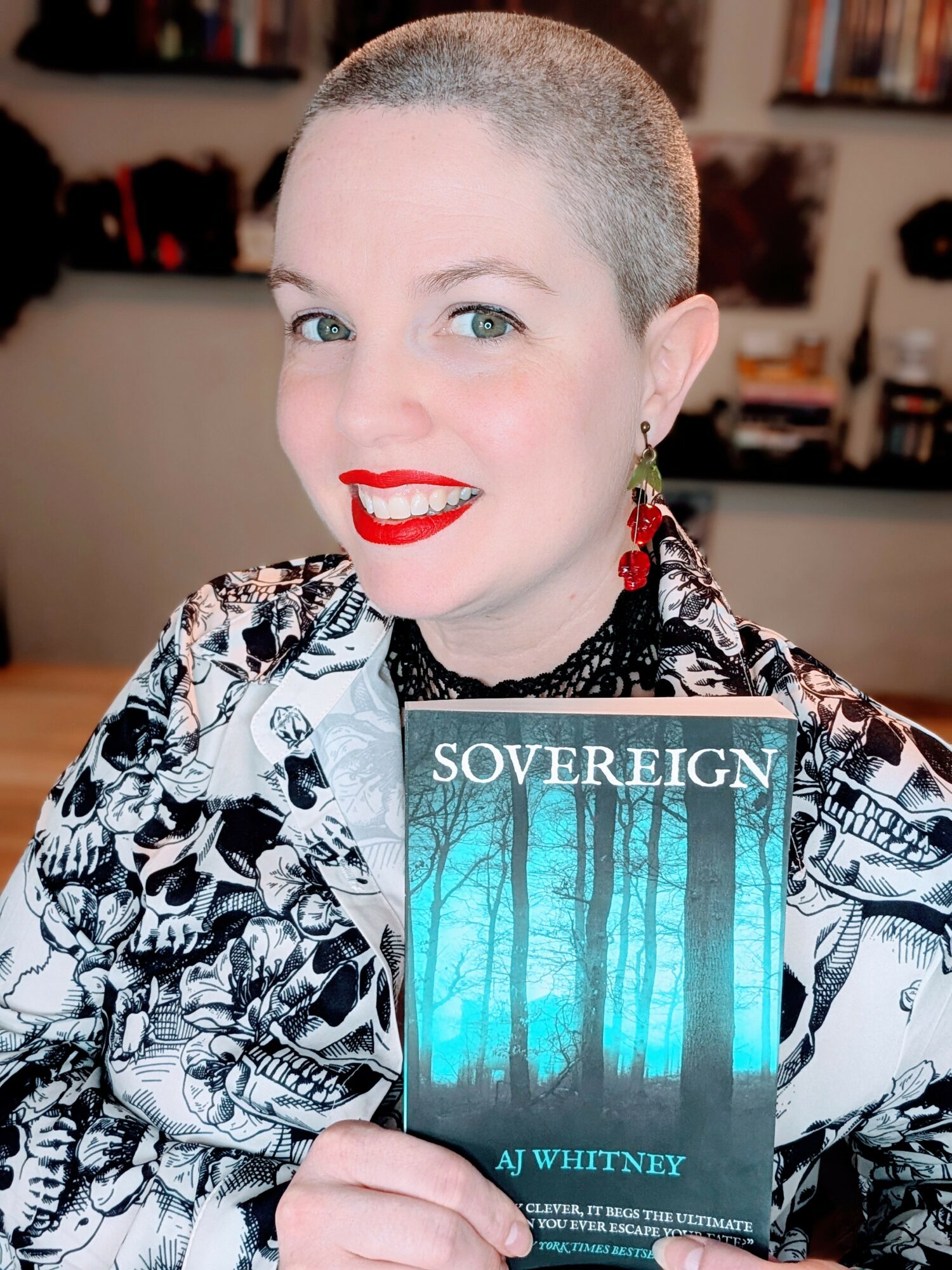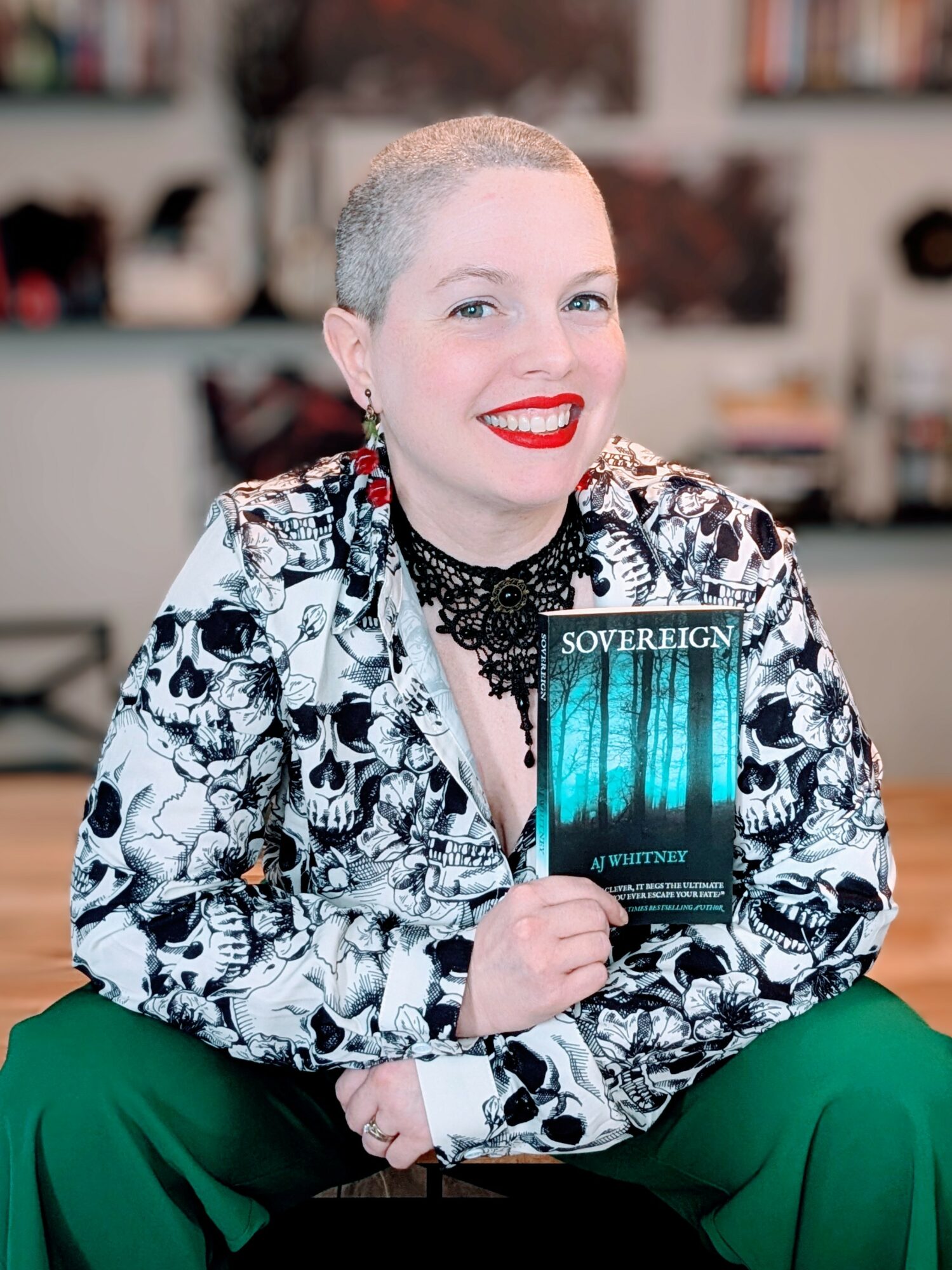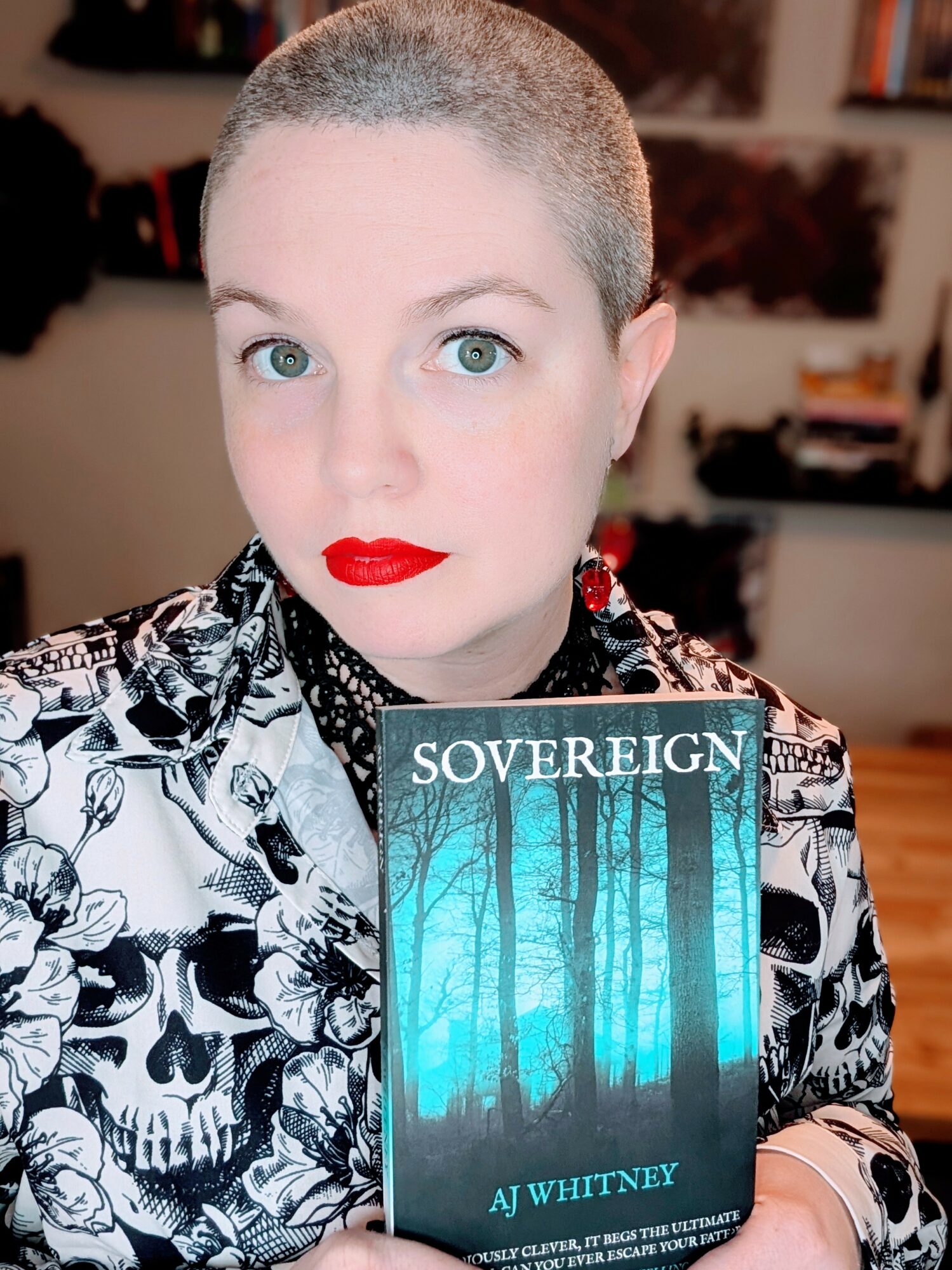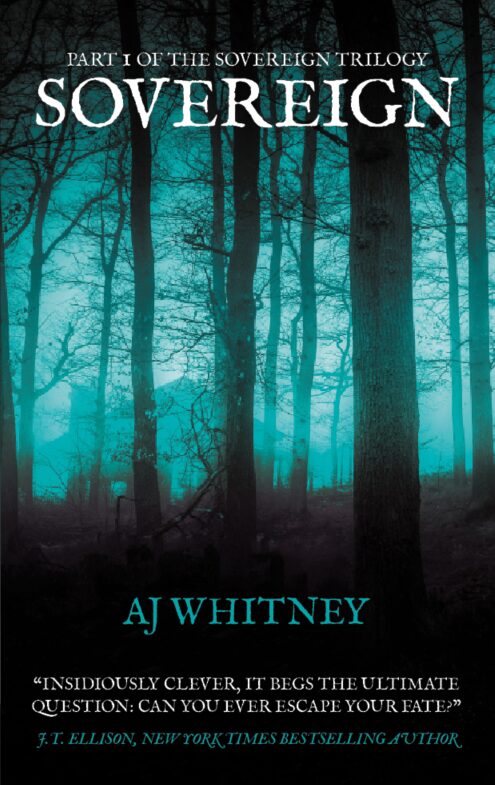

Today we’d like to introduce you to AJ Whitney
Alright, so thank you so much for sharing your story and insight with our readers. To kick things off, can you tell us a bit about how you got started?
Books are my oldest love. I taught myself to read when I was three, with a little help from Sesame Street and Mr. Rogers, and I’ve had my nose buried in a book ever since. All through school and college, I was told I was an excellent writer. I always wanted to write a book, but life seemed to get in the way. There was high school, college, marriage, and babies, followed by grad school and work and the discovery that I have Ehlers-Danlos Syndrome, a genetic illness that impacts every system in the body, causing chronic pain, frequent joint dislocations, and systemic issues that I assumed must be part of everyone’s existence for at least 30 years. Throughout all that time, my little family of four moved around a lot, living in the Ozarks, northwestern Missouri, northeastern Kansas, and even New Mexico for a little while, but we landed back in Kansas City, my husband’s hometown, in 2018 and decided to stay. He was a teacher for the Belton school district for about five years before going to work for a local nonprofit, Caring for Kids Network, that supports community partnerships in KC metro schools. I have been a school counselor in Belton, Raytown, and Ray-Pec over the years. In early 2019, once I had settled into the city and my new career, I had an incredibly vivid dream with two points of view that only connected at the dream’s end, and I knew this would be my first book. I played around with the idea for about a year until I finally sat down and wrote the whole thing during spring break of 2020, right before the world as we knew it shut down for months. I didn’t tell anyone outside my family that I was writing a book. I was so scared it would be the most awful thing anyone had ever read! But eventually I told one friend with an English degree, and she gave me some excellent feedback that helped me turn this little story into a real book. It was not until the fall of 2023 that I began letting other friends read the book, and another good friend, the librarian at Ray-Pec East Middle School, encouraged me to try to get it published. I had absolutely no idea what I was doing, but through sheer luck and coincidence I connected with someone on TikTok who had connections to a small publisher in Amarillo, TX. I spoke with the editorial director, who was incredibly helpful and talked me through what to expect and how to do some of the most important steps. He also offered to read some of my manuscript to help me determine what my next steps should be, and I wholeheartedly accepted. A few weeks later, he got back in touch with me and told me that my book was too good for me to pay out of pocket for publishing, and I should be querying literary agents and trying to get a book deal. He asked if it would be okay for him to run it up the ladder at his publishing house to see if they’d be interested in it, and there was no way I was going to say no to that! A few months later, Blue Handle Publishing offered me a deal, and my young adult novel Sovereign was born.
Sovereign is a young adult dystopian novel with folk horror vibes that follows Orphan Number 332 who was raised to be sacrificed to her isolated village’s mysterious gods. But when her village starts to question their beliefs, will 332’s life finally begin, or will the Sovereign come for everyone? At its heart, this is a story that explores groupthink and the “othering” and dehumanization of specific groups. It especially pushes back at the unconscious belief many of us hold that children are possessions that belong to adults rather than actual people whose thoughts, feelings, and opinions are valid and meaningful. 332 and her fellow Orphans are treated as less than human, and life-and-death decisions are made on their behalf without their input or any concern for how they are affected. Along with an alternate storyline centering around the much older gray-hair woman, Sovereign explores the emotions and reactions we experience when we stop having control over our own lives and live at the mercy of the decisions of others.
I’m sure it wasn’t obstacle-free, but would you say the journey has been fairly smooth so far?
Some days I feel that my entire life has been one big struggle after another. I survived a good deal of childhood trauma but used my books, my imagination, and hours-long jaunts into the woods and pastures surrounding my home to escape and cope. My chronic health issues have presented an obstacle at every turn. I had horrible stomach pains and migraines from an early age, trouble with my back and ankles starting in elementary school, and full dislocations starting in high school. By the time I reached adulthood, nothing in my body seemed to work correctly, but nobody could find anything wrong. Apart from being “double-jointed” and being able to do a lot of cool tricks, I didn’t realize there was even anything unusual about me for a long time. As it turns out, I could not have been more wrong! When one of our children was 9, we also found at that he had been born with a tethered spinal cord, a condition that could have been discovered at birth had anyone listened to us at the time. Where we lived at the time, there was very little specialized medical care for children, and we drove eight hours to Children’s Hospital of Colorado in Denver to have a major surgery. We moved to Kansas City shortly thereafter in order to have local access to better medical care at Children’s Mercy, and it’s a good thing we did, because another surgery was needed at age 12. My other child shares my Ehlers-Danlos Syndrome and was able to receive a formal diagnosis and treatment through Children’s Mercy’s EDS Clinic, one of the few clinics in the country available to children with this condition.
Apart from our family’s significant medical challenges, we have experienced many personal and professional challenges as well. My husband was previously a pastor while I was a stay-at-home mom who essentially volunteered full-time at the church we pastored. I won’t go into the details, but unfortunately, pastors are often treated poorly, and church politics conflict with the values people claim to hold. This is not true of every church, but in my experience, it has been more the rule than the exception. It may not be a surprise, then, to hear that ministry did not go well for us and caused our family extreme pain, distress, and hardship over the years. It’s not quite the same as leaving an ordinary job. You don’t just lose a source of income; you lose your friends, your family, your entire community, and usually even your home. My husband, myself, and our children had to grieve this kind of loss over and over again until we decided it wasn’t worth the pain anymore and found other careers.
After everything I have overcome in my lifetime, writing Sovereign feels like one of the easier things I have accomplished. Like I said before, I have always, always wanted to write a book, but I never had a great idea until I was almost 35. I had to figure out what process worked for me when writing. I can’t just sit down and write; I have to plan ahead and outline everything. I need to have a lot of the ideas ahead of time. I also had to do a lot of learning about how the publishing industry works — how to query literary agents, how to submit a manuscript, how to write a one-page and five-page synopsis, how the editorial process works, how to create a press kit and a website, how to build an online community and market my book on social media, how publicity works, etc. There is so much about the industry that you have to learn, and I had no idea how any of it worked at first! I’ve been learning on my feet for about five years now. The most important thing I’ve learned, though, is how to receive and incorporate feedback into my writing. Authors desperately need criticism and brutal honesty on our work. There were a lot of things I wrote in this book that made sense in my head, but the ideas weren’t clear enough to come through to the readers. It hurt to hear that my book wasn’t perfect. It was almost debilitating at first, and I couldn’t do anything with it. I actually just sat on the first feedback I received for a few months, but once the emotions cleared, I was able to read it again and understand that this was what I needed to hear to make my book the best that it could be. It was painful, but it was good. Tough love from a dear friend!
As you know, we’re big fans of you and your work. For our readers who might not be as familiar what can you tell them about what you do?
I love unusual stories — writing them, reading them, and even watching them. I write books for young adults, typically 12-18 years old, but they’re not your typical stories. There’s always a dark aspect, whether it’s a dystopian setting, evil magic, or something terrible that might happen in real life. My books are full of twists and turns; you never know what’s going to happen next, and you should never trust that you actually know what’s happening. I love cliffhangers and surprising endings.
I’ve worked with teenagers for a long time, and I love who they are and how they see the world! They are living in a space where everything happens so fast. Life is both exciting and boring, wonderful and terrible, safe and terrifying, all at the same time. They are finding out who they really are while existing with an extreme awareness that others are watching their every move and are acutely aware of every potential difference. I lived in that space too, and it was simultaneously the best and the worst time of my life. I began to know exactly who I wanted to be, and others felt threatened by me in one way or another. I was bullied mercilessly at times, but I noticed that the kids everyone wanted to be like were the ones who didn’t care what anyone thought. They did what they wanted, dressed how they liked, and walked around with their heads held high. No one ever said a bad thing about them. And I thought, “I can do that, too!” So even though I really did still care what people thought, I started to act like I didn’t, like no opinions mattered but my own. I still got bullied here and there, but if I didn’t care what the bullies thought, then the bullies didn’t have much fun bothering me and moved on. I was the one with the power. After a couple of years pretending I didn’t care, I realized that it had become my truth; I actually didn’t care about anyone else’s opinions anymore. I was free to be me and free to let others be who they were, too. It was an incredible feeling, this ability to choose who mattered and who didn’t, what got under my skin and what rolled off my shoulders. I was invincible.
That invincibility is a gift I’d like to give to every teen (and adult!) who reads my books. I want to help them understand that they are special and important. Differences are our strengths, and they should be celebrated instead of mocked. Use a wheelchair? Great! I’m so glad you have a way to get around. Only wear black? I love that you have the confidence to express yourself! From a different culture or religion? There’s so much I can learn from you! Oh, you’re LGBTQ? Thank you for trusting me! I firmly believe that there’s no such thing as “normal.” Everyone is different and weird in their own special way. I don’t want to eat peas for every meal; we need a little variety — the more, the better! Get out there and show the world who you really are, and don’t let the haters in. OWN YOUR WEIRD!
Before we let you go, we’ve got to ask if you have any advice for those who are just starting out?
1. Just write the book! It doesn’t have to be good the first time around. You can go back and fix anything you want to later on.
2. Let someone read it and give you brutally honest feedback. Decide ahead of time that you won’t let hurt feelings stop you from making your book the best it can possibly be. No one writes a great book alone.
3. Join as many writing and publishing spaces as you can — in-person critique groups, Discord servers, Facebook groups, Booktook, Bookstagram, or anything else you can find — and learn everything you possibly can. Read books and articles about writing. Take classes. Go to conferences. Read the Chicago Manual of Style. Just take some time to learn about how all of this works. Nobody figures it out over night.
4. Be prepared for rejections. If you choose to pursue traditional publishing with a legitimate publishing house, you will need a literary agent. Look on websites like QueryTracker, and, as in Tip #3 above, read everything you can get your hands on about querying and how to write a good query letter. Send out your queries in batches of about 10-15 each month. Follow each agent’s directions to the letter; they all have different requirements. And then let the rejections roll in. Even the most successful authors received hundreds, if not thousands, of rejections before they gained representation. And once you have an agent, they’ll start sending out your manuscript to publishers, and the rejections will start all over again. Once your book is finally published, you’ll get one-star reviews, and some of them will be cruel and hurtful. It’s all a rite of passage. Authors must grow thick skin! It feels much more personal than it really is.
5. Self-publishing is a legitimate way to get your book out into the world, but it is insanely hard work. Save up your money and hire professionals. You need a team behind you — from editing and proofreading to cover design to marketing and publicity. Make sure that self-pubbed book is heavily edited, and I cannot stress this enough — trust your editor! Don’t just hire someone off of Fiverr. Make sure they have experience and credentials. I cannot tell you how many self-published books I have read that sound like a third grader wrote them. You may not have a lot of money, but it’s worth it to save until you can afford professional services. Trust me; every single author needs the help!
6. READ! Read everything you can get your hands on. You’ll pick up on style and become a better writer for it.
7. Write. Just write. Not books, but anything. Write letters or emails; write in a private journal; write short stories, songs, or poems. Every single word makes you a better writer.
8. Never, ever, ever give up! This is a tough business. Your feelings will get hurt. You’ll be discouraged, You’ll want to quit. But only those who persevere ever make it big.
Contact Info:
- Website: https://www.ajwhitneybooks.com
- Instagram: https://www.instagram.com/aj.thewriter
- Facebook: https://www.facebook.com/ajwhitneybooks
- Youtube: https://www.youtube.com/@ajwhitneybooks
- Other: https://a.co/d/furSPGa


















